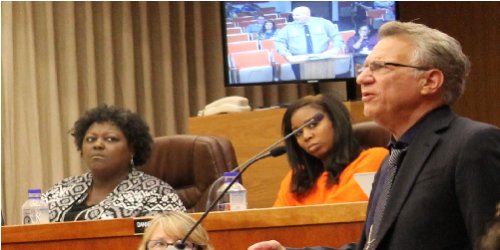 Daytona Beach, FL -
Daytona Beach, FL - Daytona Beach moves a step closer towards enacting a new ordinance regulating the growing panhandling problem in the city, possibly by as soon as next February.
After four hours of testimony last night (December 12th), the Daytona Beach City Commission ended the first evidentiary hearing regarding the panhandling ordinance. A second is scheduled for January 16th, while a public hearing in front of the DBCC is set for February 6th.
Nearly 98% of the city would still remain open to panhandlers, according to the proposed ordinance, but they would have to abide by new rules. Those include a 20-foot buffer zone around automated teller machines, commercial property, public parking lots, public restrooms and public transportation areas.
Other areas banned for panhandlers are the Daytona Beach Boardwalk, any intersection with signals (within 150 feet) and any daycare center or school (within 100 feet). There's also restrictions on panhandling when the sun is down or when the panhandler appears to be under the influence of alcohol or drugs.
Certain types of "aggressive" behavior won't be allowed city-wide, either, including approaching people in vehicles, those who dine or shop outdoors, people waiting in line to enter a business, unwanted physical contact, abusive/profane language, talking loudly and walking close to or following people who've already told a panhandler they won't give them anything.
The night began at 5 p.m. as attorney
Michael Kahn (right) called upon his witnesses to testify in favor of the panhandling ordinance. Kahn was hired by the city of Daytona Beach back on
June 19th to draft the ordinance, similar to the panhandling ordinance he created for St. Augustine.
The witnesses brought into play by Kahn range in different levels of expertise and exposure when it comes to panhandling. His first was Steven Miles, a doctor who practices in Daytona Beach and warned the public about communicable diseases which could be spread by these panhandlers, especially if they urinate or defecate in public.
Dr. Miles testified that these types of actions can spread
Cytomegalovirus, also known as CMV. It's a virus which is fairly common in humans, according to the Centers for Disease Control, but can affect the health of those with weakened immune systems and unborn babies.
Dr. Miles also stated that even though some may feel they no longer have the virus, they can still spread remnants of CMV to other people.
The other witnesses brought up by Kahn included business owners and operators around Daytona Beach, including Michael Butler, the General Manager for Joe's Crab Shack on the Daytona Beach Pier.
Butler recalled an incident where he encountered a panhandler while bring breakfast to work.
"One of the panhandlers said 'Hey, I'm hungry. Can I have your leftovers?'" Butler said. "I said they're not leftovers and I'm hungry, too. He said 'Hey, look don't be...' and then proceeded to curse."
Butler also told Kahn and the commission that customers come up to him "almost daily" to complain about the panhandlers.
The other witnesses brought to the commission's attention also included officers with the Daytona Beach Police Department, who all recalled different times that they were involved in a service call involving a panhandler.
One officer noted that drugs and drug paraphernalia can be found sometimes in the possession of panhandlers. Another noted that they saw a panhandler on the side of the road with a sign that said "Help me feed my baby," with what appeared to be a baby wrapped up in her arms.
That woman, according to the officer, asked her husband to pull over so they could give her money. As the woman gave the panhandler $10, her boyfriend showed up as well. The panhandler and her boyfriend thanked the woman before they tried to grab the woman's purse from her.
According to the officer, that's when the panhandler's boyfriend stabbed the woman in the chest before taking her purse and necklace, with the women bleeding out and dying in front of her husband and child.
The last part of the testimonies included a presentation from the city's IT department and a map that shows the proposed zones where panhandling would be illegal.
St. Augustine Police Chief Barry Fox is expected to testify before the DBCC at some point about that city's panhandling ordinance, which is what is being used by Daytona Beach city officials as a model for its proposed ordinance.
 Daytona Beach, FL - Daytona Beach moves a step closer towards enacting a new ordinance regulating the growing panhandling problem in the city, possibly by as soon as next February.
After four hours of testimony last night (December 12th), the Daytona Beach City Commission ended the first evidentiary hearing regarding the panhandling ordinance. A second is scheduled for January 16th, while a public hearing in front of the DBCC is set for February 6th.
Daytona Beach, FL - Daytona Beach moves a step closer towards enacting a new ordinance regulating the growing panhandling problem in the city, possibly by as soon as next February.
After four hours of testimony last night (December 12th), the Daytona Beach City Commission ended the first evidentiary hearing regarding the panhandling ordinance. A second is scheduled for January 16th, while a public hearing in front of the DBCC is set for February 6th.